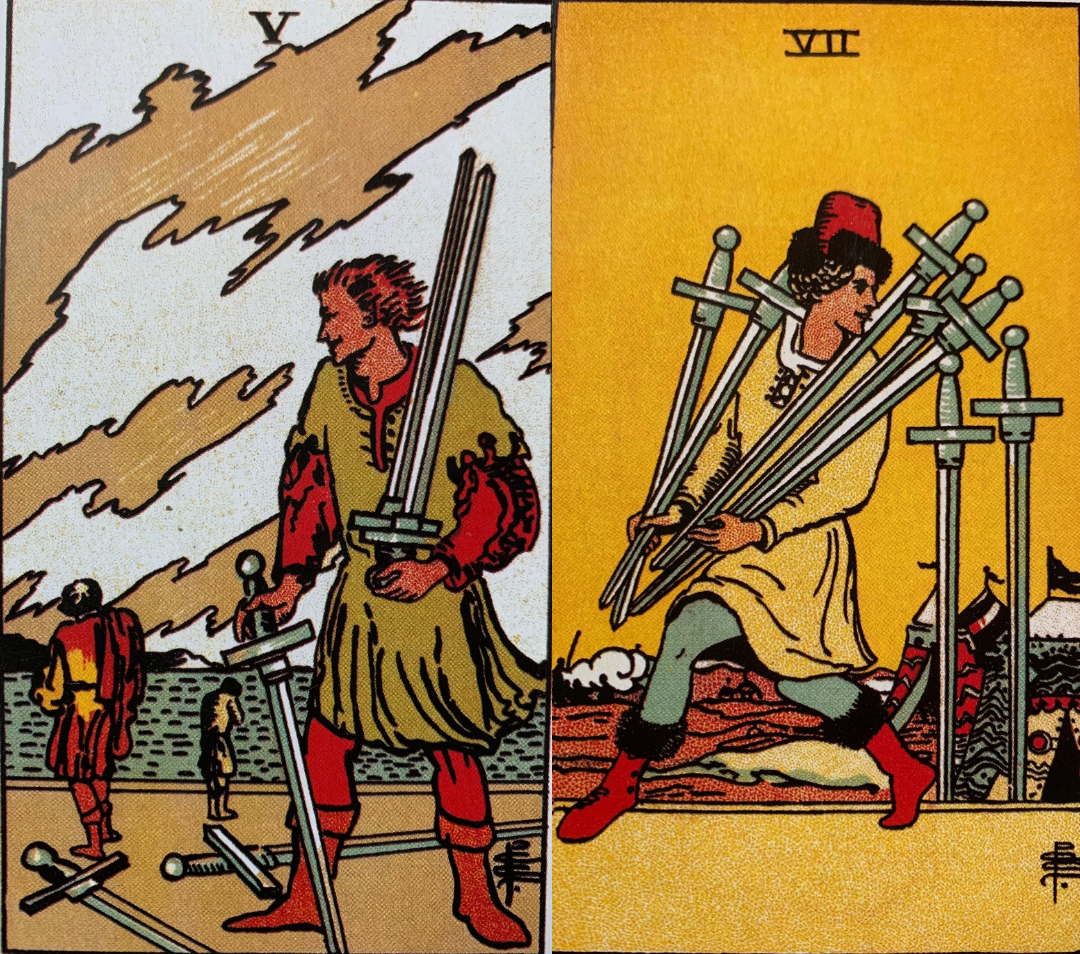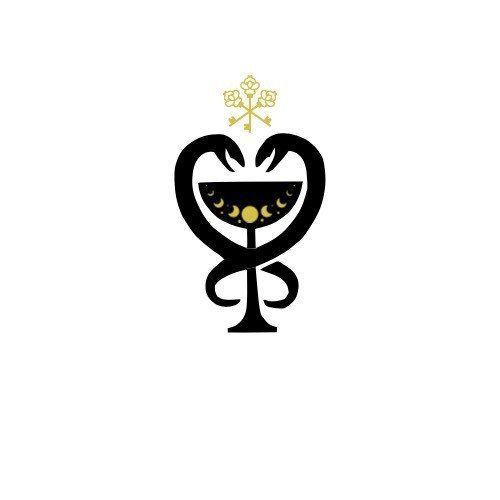Sword Play: Navigating the Differences Between the Five and Seven
In the suit of swords, not all struggles are created equal. So why is it that some cards tend to get lumped together? The differences can be subtle, sometimes even sharing some overlapping astrological correspondences. Let's get granular as we sit with the essential differences between the Five and the Seven of Swords.

The suit of swords is the suit of challenges in the minor arcana. It represents the thinking mind, the element of air, and the east within the four directions. While of course there is suffering possible in all four arenas of the self (mind, body, spirit, and soul) the majority of our human suffering takes place within our thoughts and perceptions. This is why the suit of swords is coined as the suit of challenges, because it is the home of not just our logical comprehension, but also of our anxieties. The Five of Swords and the Seven of Swords often elicit similar, uneasy responses in a reading. Popular interpretations of both of these cards involve deception, trickery, and manipulation. At times, particularly when one is early in their tarot studies, the meanings of these ultimately very different cards can be blurred into one generalized sense of dread and deceit. However, like any allies in the tarot that are initially jarring, their deeper meanings begin to unravel themselves as we explore their astrological and numerological correspondences.
The Five of Swords
Astrological Correspondences: Venus in Aquarius
Numerological Correspondence: 5
Corresponding Major Arcana Card: The Hierophant
Just as swords are the suit of struggles in the minor arcana, the fives are the numbers of struggle in the tarot. Each five card in the minor arcana depicts a struggle that requires us to surrender to a truth in some form or other. The Five of Swords in particular presents a challenge of mental and intellectual boundaries. Unlike the more emotionally-charged nature of the other three five’s in the minor arcana, the Five of Swords can appear to have a chilly and almost unfeeling demeanor. We would be wise, however, to remember that the Five of Swords is still ultimately tied to Venus (the planet of love and beauty) via astrological correspondence. For our purposes, Venus in Aquarius can be interpreted as the planet of love in the sign of collective progress. Aquarius is a sign of logic and intellect, but its tendency to favor collective progress over individual intimate connections can color Aquarian energy as emotionally distant or impersonal.
In the RWS deck, the Five of Swords contains a figure standing with two swords in their left hand and one in their right. Two swords lay at the figure’s feet and two unarmed people are seen walking away from the scene toward a coastline in the distance. Though we are unable to see the faces of the apparent former opponents, we can see that one figure is looking downward with face in hands. The wielder of the swords stands proud and smiling with wind whipping through their hair. The sky above is a jagged combination of gray and white, giving the impression that the wind is helping to divide and clear the clouds of overcast above. This imagery can certainly be polarizing, allowing the querent to see either a smiling victor or a smug villain in the Five of Swords.
There are multiple interpretations of this figure, because like all things that exist in the mind-space, there is an element of subjectivity contributing to one’s personal response. Popular depictions of the Five of Swords involve deceit and betrayal, but we would be wise to acknowledge the energetic signature of Venus in Aquarius. The work of Venus, regardless of our subjective responses to it, is always the work of love. Aquarius is the fixed air sign that oversees both individuality and collective social progress. In the scene, there is no visible bloodshed or signs of bodily harm. Though the central character clearly stands victorious in one way or another, the opponents do not appear to have suffered physical wounding. I most often think of the Five of Swords as an opportunity to name our boundaries as an act of love without fear of external reception.
The Seven of Swords
Astrological Correspondences:
The Moon in Aquarius
Numerological Correspondence: 7
Corresponding Major Arcana Card: The Chariot
The Sevens of the tarot can be thought of as the choices we make that initiate us into a way of being. Each seven card in the minor arcana presents the querent with a choice. In the Seven of Swords, this is the choice to be dishonest or conceal one’s intentions. The Seven of Swords corresponds to the Moon in the sign of Aquarius. In astrology, we can think of the Moon as the planet of inner emotions, the unconscious, and private life. The sign of Aquarius is ruled by Saturn (the planet of struggle and limitations) in traditional astrology. In contemporary astrology Aquarius is ruled by Uranus, the planet of intellectualism and ingenuity. The Moon, which is ruled by Cancer, is in its fall in the sign of Aquarius by both of these accounts. For our tarot specific purposes, we can consider these correspondences to be a cutting or ruthless sense of individuality within the realm of inner desire.
In the RWS deck, the Seven of Swords depicts a person smuggling five swords and slinking away from what appears to be a military camp. The sky is solid yellow, indicating that the person shown in the card is consciously aware of the choice they are making. In the tarot, the color yellow is an indicator of mental clarity and awareness. The figure peers backward over the shoulder with a self-satisfied smirk, where the remaining two swords are plunged into the ground unclaimed.
The Seven of Swords has varying interpretations depending on its placement within a tarot spread. Generally speaking, The Seven of Swords comes with warnings of trickery and falsehood. Unlike in the Five of Swords, the figure is pictured completely alone. This essential difference lends these seemingly similar cards their very different essences. The Seven of Swords speaks of a time where someone (either the querent or another) is choosing to veil their true intentions. Instead of stepping up to an uncomfortable situation with honesty as an act of love, The Seven of Swords attempts to avoid the discomfort entirely by choosing deception, stealing, or mind games in an attempt to achieve their desired outcome. By attempting to outwit the truth, this choice at its best leads to a sense of false victory. At its worst this choice can lead to karmic retribution, often “blowing up” in the face of the choice-maker. In simpler terms, “the truth will set you free.”
The Five of Swords VS The Seven of Swords in a Reading
This section will include a handful of placement-examples to highlight the key differences between the Five and Seven of Swords using possible interpretations.
The Five of Swords in the position of the querent’s current energy: There is a truth inside of you that must be expressed, even if it is uncomfortable or intimidating.
The Seven of Swords in the position of the querent’s current energy: You have chosen to conceal a truth inside of you because it is uncomfortable or because you believe it will obstruct your goal.
The Five of Swords in the position of a querent’s lover: A person who expresses their truth openly with little concern for how it may be perceived. Possibly an overly-frank person.
The Seven of Swords in the position of a querent’s lover: A person who seeks to hide their truth out of concern for how it may be perceived or obstruct their goals.
The Five of Swords in the position of the best way for the querent to move forward: Stand firmly by your truth as an act of love. Have faith that regardless of others’ reactions, you have chosen honorably by prioritizing honesty.
The Seven of Swords in the position of the best way for the querent to move forward:
Sometimes, we have to choose ourselves in order to preserve our truth and move forward. If you are in a situation that involves another who has caused or wished you harm, you are within your right to draw a boundary without further explanation.
The Five of Swords in the position of a querent’s immediate environment: You are surrounded by a myriad of subjective truths, and perhaps they are not all so easily accepted. Sit with these potentially conflicting truths as objectively as you are able. Remain centered in your own subjective experience, but allow your truth to be informed by all factors in a way that feels authentic to your experience.
The Seven of Swords in the position of a querent’s immediate environment: You are surrounded by a myriad of personal agendas. This can be positive, negative, or even neutral, but you would be wise to remember that “every person for themself” is the bottomline in this particular environment. Beware of potential veiled intentions.
The Five of Swords in the position of a querent’s hopes and fears:
You are harboring a truth that must be expressed. You may hope that when you share what is on your mind, it will be received as an act of love through honesty. You may fear that this truth will be received as a personal slight, leaving you alone as a result.
The Seven of Swords in the position of a querent’s hopes and fears:
You are harboring a truth that you are choosing to conceal. You may hope that by avoiding this truth you can shield yourself from the discomfort of your truth being perceived by another. You may fear setbacks in your personal goals and ambitions, leading you to hide it from the outside world.
Cheers,
Sarah

